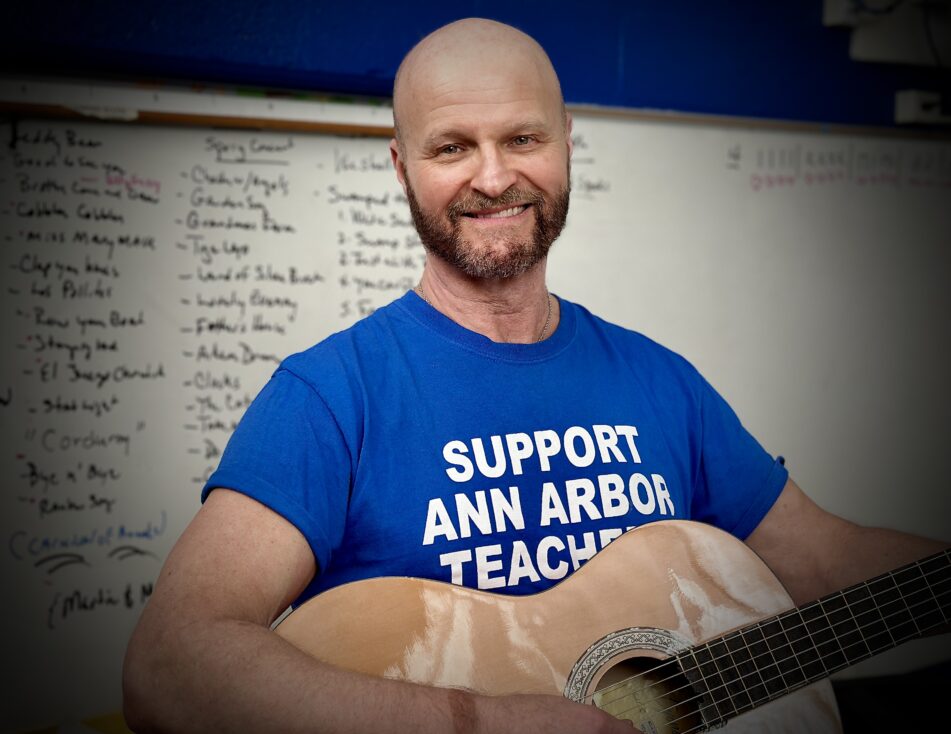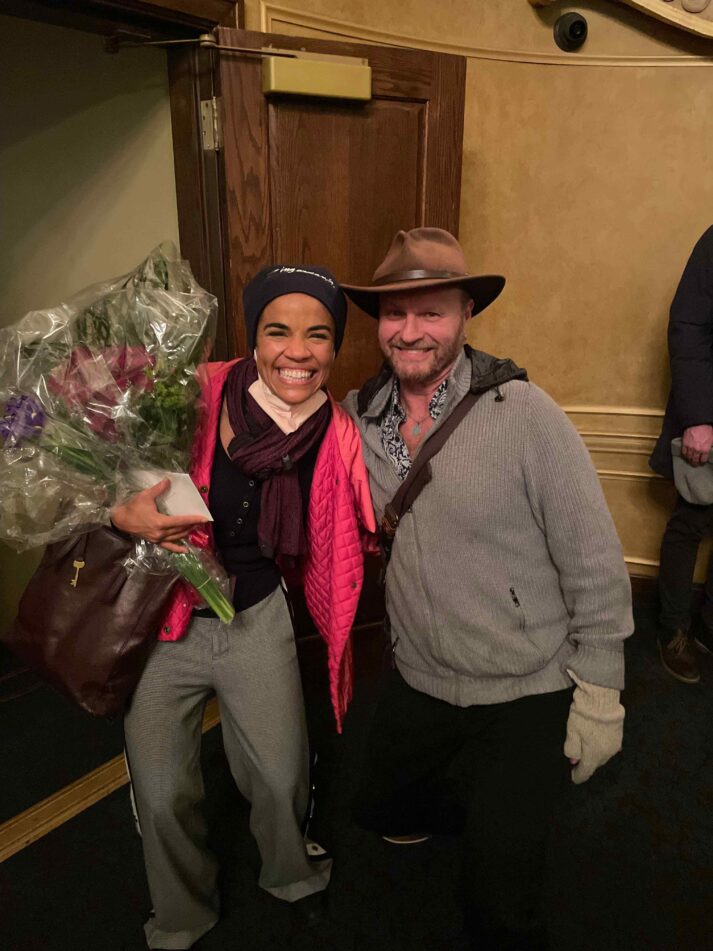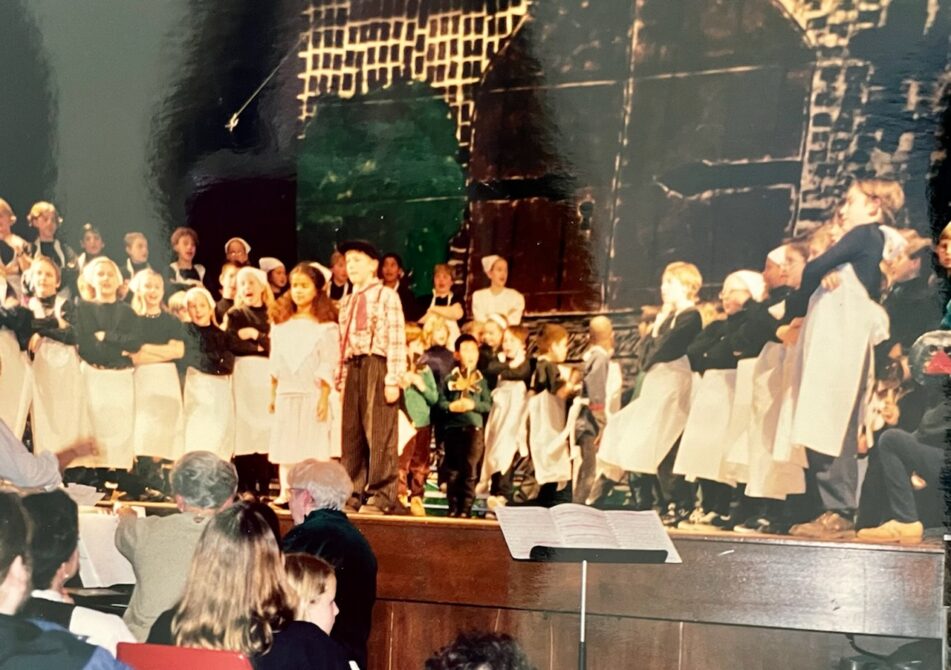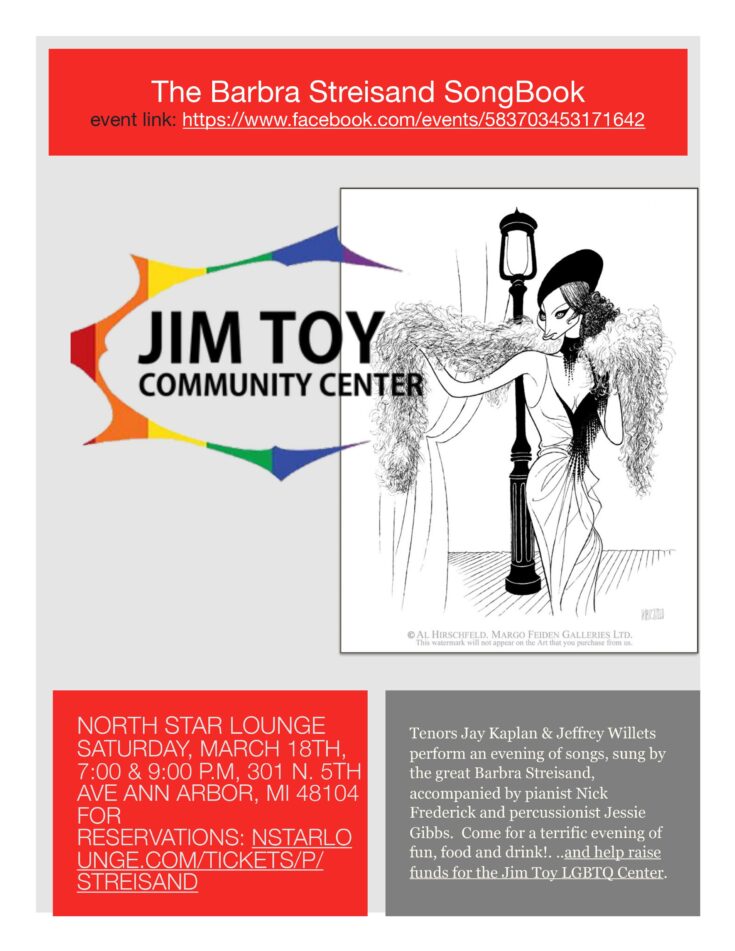

If you’ve been part of the AAPS community for any length of time, you may have heard about some of the musical programs at Eberwhite Elementary.
The teacher making it happen: Jeffrey Willets.
“Jeffrey is an inspiration to the children at Eberwhite,” says Principal Michelle Hubbard. ” “His passion for music is contagious and his dedication goes beyond the day-to-day curriculum. Jeffrey understands how he can impact the future and it begins with every child being proud of who they are no matter what their strengths. Mr. Willets is an invaluable member of the Eberwhite community and I am honored to be part of his team.”
Eberwhite Elementary music teacher Jeffrey Willets grew up in Ann Arbor, the fourth of five children. His mother, Irene Willets was a classroom teacher in South Rockwood and then at St. Alexis in Ypsilanti, while his father, Stanley, was an internal auditor for Eastern Michigan University.
Willets attended Carpenter Elementary, Scarlett Middle School, and Huron High School, and earned his bachelor’s and master’s degrees from EMU. He has also studied at The New England Conservatory of Music in Boston.
He has been teaching at AAPS since 1985.
Willets lives in Pittsfield Township and is the proud owner of a rescue cat named Oreo Cookie. He loves gardening, strength training, performing (trained in classical singing), working with children, movies,
books, raising animals of all sorts (I raised homing pigeons at one time), and long naps.
Your musical productions at Eberwhite are epic. Bottom line: How do you do it?
I had a terrific music teacher in the late 60s and early 70s named Mary Anne Hall. She was my
elementary music teacher at Carpenter School and she is my inspiration. She left and moved to NYC
and started “Music For Little People” a big children’s music program on the East Coast. Growing up, my
sister, Suzanne Willets-Brooks, a dancer and integrative movement specialist, and I used to put on plays and haunted houses. I’m a big kid at heart.
Editor’s note: Click here to see highlights from Willets’ annual back-to-school welcome for families.
What was always written on your report card in grade school?
“Jeffrey could succeed in this area (you name it) if he worked a bit harder.” I was diagnosed with dyslexia in seventh grade. I was always the “slower learner.”
Can you elaborate on that diagnosis?
I was 12/13 years old at Scarlett Middle School. That year, Scarlett had a safety net reading recovery program. Mrs. Moody, (now retired) flagged me and spoke with my mom about my reading. I had trouble spelling and poor handwriting. Cursive was tough! I avoided reading, I struggled with words and I had trouble hearing sounds in words. Mrs. Moody was so kind and worked with me. They called it something else back in the late 70s, but by 1980 or so, I had the diagnosis: She, and later other teachers, helped with texts that I could practice with. They used multisensory approaches to help me learn to decode and I learned to look for familiar patterns and learned to track.
When did you know that a “slow learner” could go on to earn his master’s degree?
I was a terrific performer and music student. I knew I could do that. I had a hunger for learning- no matter how long it took. So, I decided to pursue it.
How do you encourage students with dyslexia?
I use a lot of music texts in class, as well as other methods for teaching songs (multisensory: orally, aurally, movement, etc.) I always share my story with kids about being called “slow” and how it made me feel. I share with them that everyone can learn and to never give up. I tell them: Get one or two words, and move from there. I often pair kids up to help support each other.
Are there any ways dyslexia has made you a better educator?
Definitely. It takes me a long time to learn things. I think my learning path has made me sensitive to the learning styles of my students. I think that—since I’ve had to try different paths to learning—I can “break things down” for my students so that they all benefit.
What are your fondest memories of music/theater classes when you were growing up?
I loved middle school choir, with my then, teacher Ken Westerman, and High School Choir with
Huron High School Choir Director Ruth Datz and Drama Teacher Jan Stolereski- made learning
fun, as well as challenging.
What inspired you to become a teacher?
Ken Westerman, my middle school teacher. I wanted to be just like him.
Why a music teacher?
My parents were divorcing in the ’70s my little sister was really ill with anorexia and my world was falling apart. Music was my lifeline. I knew I could sing.
What instruments do you play?
Piano, beginning strings.
If you could sing like anyone, living or dead, who would that be?
Mario Lanza.
What’s the best compliment anyone could give you?
In the 90s at the Open School, I cast 8-year-old Brittany Coleman as Mary in our version of the musical “The Secret Garden.” She went on to make it on Broadway and was interviewed by “Backstage” newspaper, which asked her where she got her start. She said, “I think I was 8 or 9, and my music teacher, Jeffrey Willets, cast me in the role of Mary. It was from him that I found my singing voice and my love of storytelling.” I was floored and most humbled.



Will you sing something for us?
(Using the microphone on his computer, Willets recorded the end of a tenor aria (Pour Mon Ame) from “La Fille du Regiment” by Donizetti. “Not the best recording, but you get the idea. But very different from my cabaret sound.”)
During your long career, what’s the most important thing you’ve learned about teaching? About learning?
I’ve learned that there’s always MORE to learn! And I’ve learned that certain programs and things seem to return to the teaching world with a new label, but they are the same.
Describe an average workday.
It usually involves eight to 10 classes a day, usually back to back lasting 30 minutes to 50 minutes in length, different grade levels next to each other (so I have to be on my toes), copying of parts, burning of
rehearsal CDs, researching musical topics, communicating with peers, in and out of the building, and going home happy, but exhausted!
What advice would you give to a first-year teacher?
You will be overwhelmed. Breath, breath, breath. Do what you can and just keep learning.
What’s the happiest part of your day?
Lunch! After a work-filled morning, I love, love, love, my lunch period.
What are the biggest challenges you face at work?
The changing assessments, special education laws, lockdown drills, and parent expectations.
Favorite websites:
Music is Elementary.
If you could know the definitive answer to any one question, what would that question be?
“Why we exist” is a good one.
What makes teaching at Eberwhite unique?
I love the students, staff, facilities, and my colleagues. I also really love my principal, Michelle Hubbard. Also, an anonymous donor just donated $12,000 to my music program! Someone likes me!
What do you know about teaching now that you wish you’d known that first year?
Not to try to accomplish everything in a day, a week, or a month. Things take time.
How do you keep students engaged?
I use a Kodaly method going from a “Known to an unknown”.. this creates a natural tension and release in the learning process. The rest is just being myself.
How do you show school spirit?
I wear Eberwhite T-shirts.
What is the most rewarding part of teaching?
Watching kids enjoy making music.
What do you wish everyone realized about the work of a teacher?
It’s a lot of work. Rewarding, but a lot of work, and should be rewarded much more, monetarily, than the profession is currently.
How do you recharge?
I sing, I strength train, I garden, I read, I travel. Italy is my favorite place and Greece, too.
How do you spend your summers?
I work, sometimes at odd jobs, but otherwise, perform/sing, garden, inline skate, travel, and sleep.
What’s most exciting about your professional life right now?
My professional life is on a high, I would say. I love my work environment (live performances are back
on), the anonymous donor has refurbished my classroom instruments and we have a terrific new
principal and new staff members.


Be the first to comment